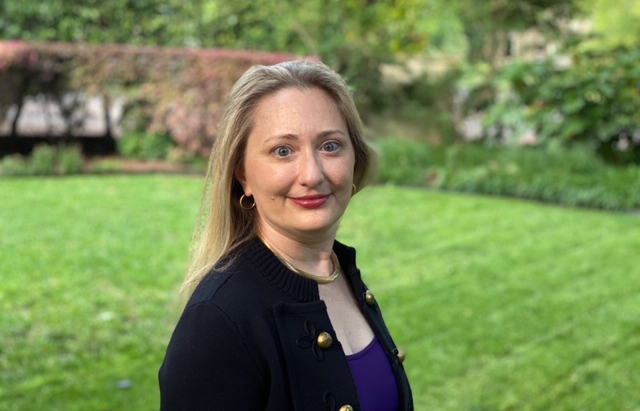Kelly Braddy Van Winkle ’99 is convinced that the future of a Duke education can still be found in the (virtual) stacks.

By Greg Jenkins, Senior Writer, Duke Alumni Engagement and Development
Kelly Braddy Van Winkle says she has finally stopped bouncing.
For years, when she was introduced to innovative, interesting new work at Duke, she dove into it, supporting it financially and as a volunteer… until the next interesting idea came along and she bounced over to it. Then Van Winkle learned about the Human Rights Archive at Duke Libraries, and it felt like a place she could invest in long-term.
As a comparative studies major specializing in Western Europe and Latin America, Van Winkle considered a Ph.D. program in Latin American studies with a focus on South American dictatorships. Instead, she became an entrepreneur and started her own industrial tool supply company. Now living in Dallas and running her family’s roofing business, her heart and mind are still with human rights challenges in Latin America and beyond—97 percent of her employees are of Latin American descent.
“I love that Duke Libraries has this collection,” she says. “Even now, almost twenty-five years since I graduated, these issues remain so important to me.”
With Duke Libraries established as her main avenue of support, Van Winkle recently established an estate gift that will benefit the Libraries. She also has made an expendable five-year gift to provide current support for the Human Rights Archive.
What’s so special about the archive? Starting in 2006, it has acquired, preserved, described, and provided access to the records and papers of human rights advocates. Its archival partners include grassroots organizations and transnational NGOs, religious and political leaders, human rights advocates, and artists. The Human Rights Archive’s collections show the impact that organizations and individuals have made on government policy in support of human rights, and the important role they played in the development and transformation of the international human rights movement. Early strong support from faculty in Latin America and Caribbean studies is reflected in the archive’s extensive holdings in this area.
Van Winkle is also convinced of the importance of libraries in general. She sees them as places of community and gathering where students learn together, peer to peer. Keeping libraries modern by supporting digitization is another major component of her support. Her family has a long relationship with Penn State University, so she participates in similar support of these efforts at their libraries.
“I think this is my calling now,” Van Winkle says. “I’m now going to be working with the Penn State libraries and the Duke Libraries. The concept is the same in both. It’s similar in preserving the student experience.”
Van Winkle’s grandfather started a residential roofing company in Erie, Pennsylvania, during the Great Depression that thrived despite the times. It was largely weather (100+ inches of snow per year) that prompted the company to move to Texas in the mid-1980s, where they could perform commercial construction year-round.
In 2011, Van Winkle closed her tool company and joined the family business, King of Texas Roofing Company. In 2019, she was named CEO, and in 2020 the company was certified as a woman-owned business by the Women’s Business Enterprise National Council.
Naturally, Van Winkle has a vested interest in helping women in male-dominated businesses. She sees libraries as a place where speakers and other experts can address issues of female leadership, creating an archive of material on that subject.
Meantime, she will continue on the leadership council of the Duke Women’s Impact Network (WIN), promoting female philanthropy and leadership. “Everyone in that group is so dynamic,” Van Winkle says. “Every single person in Duke WIN has given selflessly above and beyond.”
Van Winkle is well-aligned with WIN’s mission of female empowerment. Just as she’s changing the culture in the roofing industry, she’d like to be a part of a paradigm shift in philanthropy, starting at Duke.
“Believe it or not, in 2023 I still know a lot of couples where the woman isn’t making the philanthropic decision,” Van Winkle says. “There are still a lot of women who don’t have their own voice to decide on their own philanthropy. So our goal is to try and enable women to say where they want their money to go.”
This story originally appeared on the Giving to Duke Blueprints blog. Reprinted with permission.

